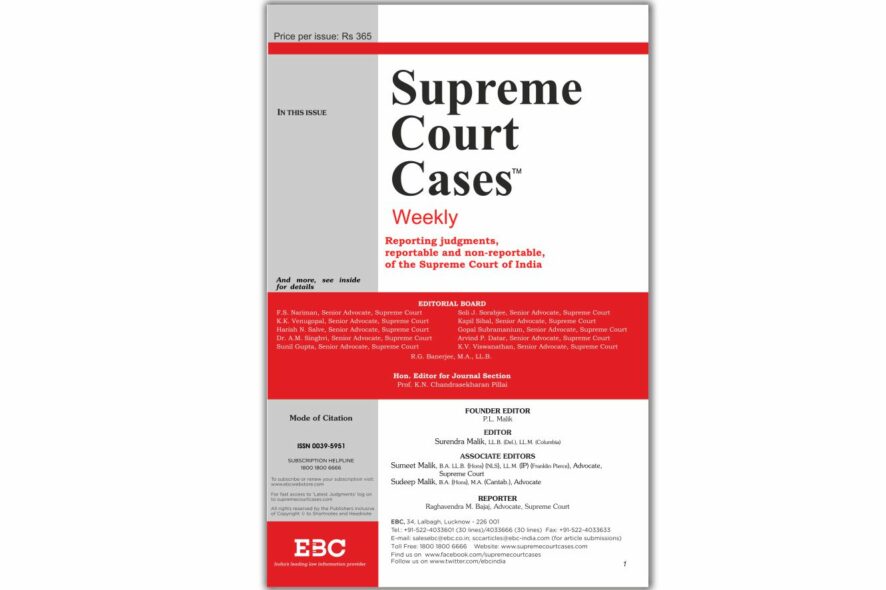2021 SCC Vol. 6 Part 3
In this part read a very interesting decision delivered by the Supreme Court expertly analysed by our editors. Supreme Court held that given the object of speedy disposal sought to be achieved both under the Arbitration and Conciliation Act, 1996 and Commercial Courts Act, 2015, for appeals filed under section 37 of the Arbitration Act that are governed by Articles 116 and 117 of the Limitation Act or section 13(1A) of the Commercial Courts Act, a delay beyond 90 days, 30 days or 60 days, respectively, is to be condoned by way of exception and not by way of rule. [State of Maharashtra v. Borse Bros. Engineers & Contractors (P) Ltd., (2021) 6 SCC 460]
Short Notes: 8
Arbitration and Conciliation Act, 1996 — S. 37 — Limitation period for filing appeals: Arts. 116 and 117 of the Limitation Act are not applicable for filing appeals under S. 37 of the A&C Act, 1996 in respect of cases falling under Commercial Courts Act i.e. where specified value is not less than three lakh rupees. Rather, it is S. 13(1-A) of the Commercial Courts Act which provides the forum for appeals under S. 37, as well as the limitation period to be followed. S. 13(1-A) of the Commercial Courts Act lays down a period of limitation of 60 days uniformly for all appeals under S. 37 where specified value is not less than three lakh rupees. [State of Maharashtra v. Borse Bros. Engineers & Contractors (P) Ltd., (2021) 6 SCC 460]
Constitution of India — Arts. 191, 190 and 80(4) — Membership of State Legislative Assembly/Council — Disqualifications — Applicability and consequences thereof: Right of an MLA, on becoming disqualified, to cast his vote in an election by MLAs, held, ceases upon such disqualification being incurred. [Pradeep Kumar Sonthalia v. Dhiraj Prasad Sahu, (2021) 6 SCC 523]
Constitution of India — Sch. VII List III Entry 25 and List I Entry 66 — Legislative competence of States to make reservation for in-service doctors in the State quota in postgraduate degree/diploma medical courses — Scope and limitations: States have legislative competence and authority to provide for a separate source of entry or reservation for in-service candidates seeking admission to postgraduate degree/diploma medical courses in the State quota, in exercise of powers under Sch. VII List III Entry 25 of the Constitution. However, such policy must also provide that such in-service doctors getting benefit under such policy should serve the State in the rural, tribal and hilly areas for five years at least after obtaining the degree/diploma and for that they must execute bonds for such sum as the respective States may consider fit and proper. [T.N. Medical Officers Assn. v. Union of India, (2021) 6 SCC 568]
Motor Vehicles Act, 1988 — S. 173 second proviso — Appeals beyond period of ninety days: Word “may” used in S. 173 second proviso, is not a word of compulsion and it is an enabling word and it only confers capacity, power or authority and implies discretion. Thus, word “may”, held, is used in S. 173 to confer sufficient discretionary powers upon the Court to entertain appeals even beyond the period of ninety days. [Brahampal v. National Insurance Co., (2021) 6 SCC 512]
Narcotic Drugs and Psychotropic Substances Act, 1985 — Ss. 32-B and 21 — Factors to be taken into account while imposing punishment/sentence higher than the prescribed minimum: Factors other than those mentioned/enumerated in S. 32-B of the NDPS Act can be considered. Court may take into account such factors as it may deem fit and also the factors enumerated/mentioned in S. 32-B of the NDPS Act but, where the court considers such factor(s) as it may deem fit other than the factors enumerated in Ss. 32-B(a) to (f) of the NDPS Act, then such factor(s) must be relevant factor(s). Quantity of narcotic substance/drug with which the accused is charged, held, is a relevant factor which would fall within the ambit of expression “such factors as it may deem fit”. Hence, can be taken into account while imposing punishment/sentence higher than the prescribed minimum. [Gurdev Singh v. State of Punjab, (2021) 6 SCC 558]
Service Law — Appointment — Substituted appointment: Entitlement to continue in place of substituted person, held, terminates if substituted person establishes that they were wrongly substituted. [State of Odisha v. Kamalini Khilar, (2021) 6 SCC 546]







Online supreme court cases judgement are very useful to Advocate to manage day to day case administration. Really excellent and extremely fanatic helpful